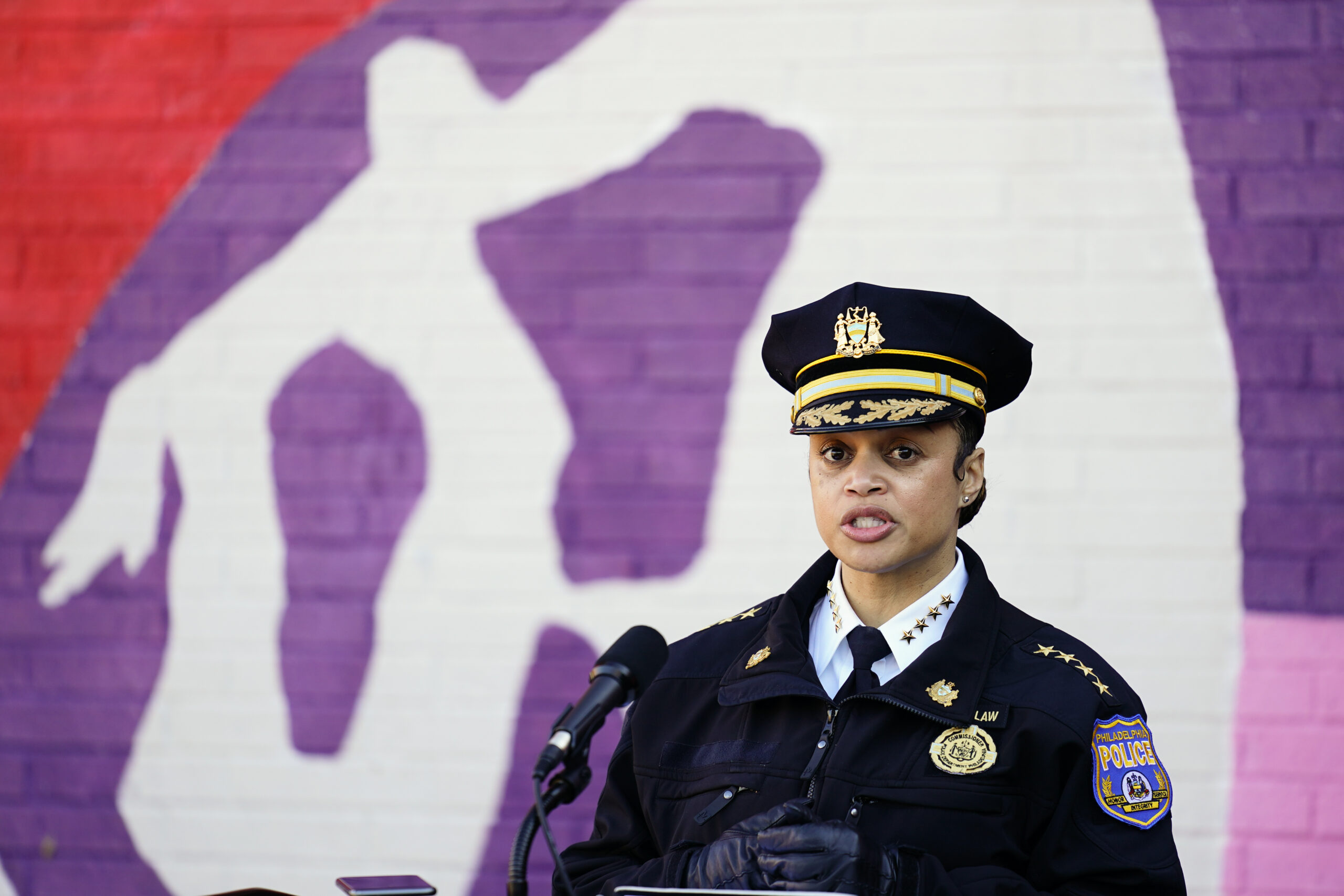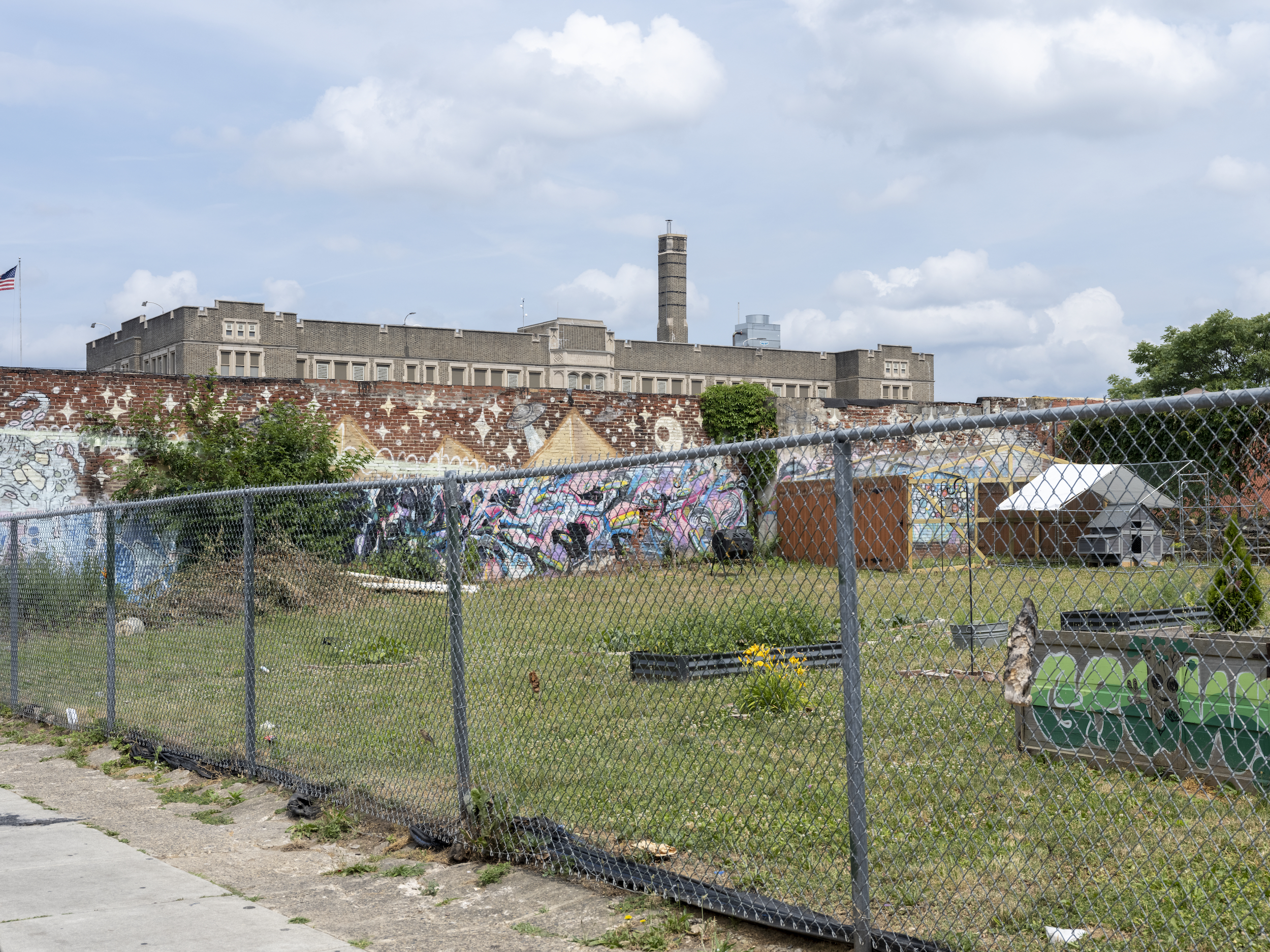Earlier this month, Philadelphia Police Commissioner Danielle Outlaw stood before a larger-than-usual gathering of journalists from local and national outlets. She’d summoned them to discuss a topic that has come to define the city: murder.
It had been a particularly bloody week, with eight killed by the time Outlaw, 46, stepped into the glare of the cameras’ lights.
Five of the victims were Black men between the ages of 19 and 43 – all shot, and no arrests made. One victim was a 29-year-old Hispanic man who was also shot in an unsolved case. Two victims were white women ages 31 and 59, both killed in domestic violence attacks. One of those two cases resulted in an arrest, and the other was a murder-suicide, police said.
Outlaw, who took the helm of the nation’s fourth-largest police department in February 2020, was not there to discuss the ongoing violence crisis that has resulted in some businesses closing and the owner of a string of gas stations hiring armed guards to patrol his lots.
Outlaw, instead, was there to update the press on a breakthrough in a 65-year-old homicide that has come to be known as the Boy in the Box case. Through dogged investigative work and DNA analysis, the Police Department announced that it had finally learned the identity of a boy who was found naked, bruised, and lifeless in a discarded box in 1957.
The development, Outlaw said, “gives me hope that we can continue to identify unknown victims of crime, and that no one will ever again have to wait this long for their name and the story of their life to be told.”

When asked about the immense time and resources spent on the decades-old case — which still remains unsolved — while fewer than 50 percent of homicide cases on her watch have resulted in arrests, she grew defensive.
“We can solve half of the cases in this city, and we have,” she inaccurately insisted during the question-and-answer portion of the news conference. The real number was closer to 42 percent last year.
“Because we announced something historic today does not take away from the arduous work of our detectives and surrounding partners here in this city,” Outlaw added. “I can understand why people may feel that way, but this case was a big deal.”
With the city passing the grim milestone of 500 homicides before the end of the year for the second year in a row on December 19, some are asking why Outlaw has not received more blame for the killings.
Larry Krasner, the city’s progressive Democratic District Attorney, has had responsibility heaped on him — and has been impeached by state Republicans, who accuse him of being soft on criminals.
While Krasner prepares to be tried next month in the state Senate, Outlaw is receiving empathy from lawmakers. Critics take issue with Krasner because he has pursued his goal of ending mass incarceration by prosecuting fewer violent and nonviolent crimes, like retail theft and prostitution. In an October report that criticized Krasner, House lawmakers wrote that: “The select committee shares … Outlaw’s outrage that arrests in Philadelphia are not leading to criminals being removed from the streets.”
Meanwhile, as the mayoral race heats up, people are considering whether Outlaw should keep her job in a new administration in 2024. “I do not hold the commissioner solely at fault for what we are witnessing in the city,” said the Reverend Mark Kelly Tyler, pastor of the historic Mother Bethel AME Church in Old City. “There are a lot of people who are responsible.”
Between 2017 and this September, the Philadelphia Police Department made arrests for just 38.5 percent of fatal shootings, and 19 percent of nonfatal shootings. The national average is about 50 percent for homicides. The House committee that investigated Krasner attributed this abysmal record to police “staffing challenges.” There are currently hundreds of police officer vacancies, according to the department’s public affairs office, representing nearly 12 percent of the officers the department is authorized to employ.
And when police do make arrests in gun possession cases, Krasner withdraws charges at roughly twice the rate as the statewide average, the House committee found: In 2019 and 2020, charges associated with certain firearms offenses were withdrawn by Krasner’s office at a rate of 18 percent and 20 percent, respectively, compared to 8 percent and 10 percent statewide.
When asked about the Police Department’s poor track record on arrests, Krasner demurred from criticizing Outlaw or her department. “This is a national problem. It’s decades-long in the making,” Krasner said. “If you look nationally, the solve rate, the clearance rate for these types of crimes have been failing for decades.”
“We’re all working together,” he added. “That’s part of the reason that, rather than saying, give me, the District Attorney’s Office, $50 million for a forensic lab, I’ve been saying for four years give it to the Philadelphia Police Department.”
Dealt a tough hand
Outlaw spent 20 years rising through the ranks of her hometown police department in Oakland, California, before she was hired to be chief in Portland, Oregon in 2017. Philly Mayor Jim Kenney chose her from more than 30 applicants to replace Richard Ross, who resigned amid allegations of sexual misconduct.
Since coming to Philadelphia, the harshest criticism Outlaw has received was over her decision to use tear gas and other heavy-handed tactics during the protests that erupted in response to George Floyd’s murder by Minneapolis police officers in May 2020.
Among those calling for Outlaw’s ouster was The Philadelphia Inquirer, the city’s oldest and largest newspaper. “Over the course of three days and many bad decisions, the police created chaos and danger instead of delivering order and safety,” the paper’s editorial board wrote. “There is no more profound law enforcement failure than that. There is no simpler rationale for the mayor to ask the police commissioner to resign.”
Since then, Outlaw’s stock appears to have risen. When speaking of her, anti-violence activists and community leaders use phrases like, ‘She was dealt a bad hand,’ and, ‘Her hands are tied,’ followed by their condemnation of Krasner, Kenney, and the City Council — the latter for passage of a bill banning police officers from pulling over motorists for minor offenses like broken taillights and improperly displayed registration and emission stickers.
“The commissioner has done all she can do with the type of manpower she has, with the power that City Council has taken from her, and with the direction she is getting from her employer, the mayor,” said David Fisher, president of the Greater Philadelphia Chapter of the National Black Police Association.
“It’s very difficult for Outlaw because we have a DA that’s very, very soft on crime. So it’s difficult for her and her officers,” said Greg Thompson, a Southwest Philly ward leader and founder of Don’t Fall Down in the Hood, which mentors court adjudicated youth.
Less cops, less arrests
Very few of Philadelphia’s gun crimes result in arrests and court cases, though that number has increased slightly since Outlaw took over in 2020 and now stands at 23 percent this year.
“If you don’t get a very high level of case closure from the police then you’re not going to get a lot of convictions,” said Jason Gravel, a professor of criminal justice at Temple University. “She probably should get a greater share of responsibility for the gun violence. But at the same time,” he added, “I don’t know that there’s any evidence that the relationship between a police commissioner and gun violence are so closely related that if you change a commissioner, all of a sudden violence goes up or decreases.”
Despite the drop in officers, the president of the police officers’ union stands behind Outlaw. “We’re doing the best we can with the manpower that we have and the current district attorney,” said John McNesby, who likened the department’s plight to carpenters working without tools.
The city is trying to hire more officers by waiving the Police Department’s residency requirement, among other steps. “The city just came up with a retention bonus, and they also put out a signing bonus,” McNesby said. “It’s just not a high-profile job right now.”
After her news conference, Outlaw did not respond to further questions on why there are so many vacancies and what she is doing to attract more recruits — and solve more murders.
A new mayoral decision
Those seeking to become the city’s next mayor have said that addressing gun violence will be a top priority, one that must involve the police.
Eight of the leading mayoral candidates were asked by The Trace to assess Outlaw’s job performance and whether they would keep her as commissioner. The five who responded sidestepped, saying that they’d bring sweeping changes to officer recruitment, deployment, and community involvement.
Regarding whether they’d keep Outlaw, only one said yes.
To Cherie Ryans, Philadelphia’s gun violence is personal. Her son Terence was gunned down with his best friend at 40th and Walnut Streets after leaving a movie theater in 1990, becoming two of 500 homicide victims in what was the deadliest year until 2021.
She cries easily when talking about her son, whose pictures she has affixed to posters that she carries when volunteering with the city’s Group Violence Intervention program. She also cries when reflecting on the fact that the city is no safer 32 years after her son’s slaying.

But she supports Outlaw, who she has never met, for many reasons. “She’s trying to mend together something that’s already broken. I want her to succeed because she’s a woman, she’s a mom, and she’s African American,” said Ryans, who is Black. “I don’t want her to fail because so many people are fighting against her. It’s hard to fix something that is broken.”

